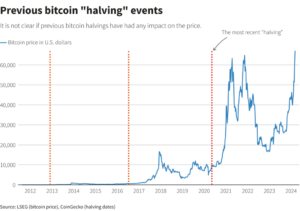
- Nigeria’s Securities and Exchange Commission (SEC) declared the exchange and its subsidiary, Binance Nigeria Limited, “illegal.”
- The SEC’s primary contention is that Binance operates in Nigeria without registration or regulation from the agency.
- Furthermore, the SEC has warned Nigerians against investing in Binance or other cryptocurrency-related activities.
In a significant blow to Binance, the world’s largest cryptocurrency exchange, Nigeria’s Securities and Exchange Commission (SEC) declared the exchange and its subsidiary, Binance Nigeria Limited, “illegal.” The SEC’s announcement has raised concerns about the regulatory status of Binance’s operations in the country and the implications for cryptocurrency investors. This may hamstring Binance significantly in its quest for dominance in Africa.
The SEC’s primary contention is that Binance operates in Nigeria without being registered or regulated by the agency. According to the SEC, this lack of oversight renders Binance’s activities in Nigeria illegal. As a result, the commission has directed Binance to cease its operations within the country immediately.
Furthermore, the SEC has warned Nigerians against investing in Binance or other cryptocurrency-related activities. The commission cites the lack of investor protection and the potential risks associated with cryptocurrencies as reasons for its cautionary stance. This move aligns with the Nigerian government’s increasing efforts to regulate the cryptocurrency industry within its borders.
Nigeria has been a significant market for cryptocurrency adoption, with a considerable volume of transactions occurring through peer-to-peer trading platforms. However, the Nigerian government has recently taken steps to restrict the use of cryptocurrencies. And in February 2021, the Central Bank of Nigeria issued a directive banning financial institutions from processing cryptocurrency transactions.
Nigeria moving on cryptocurrency regulation
Adding to the regulatory landscape, the Nigerian government passed the Finance Act 2023, which includes provisions to impose a 10% capital gains tax on digital assets, including cryptocurrencies. This tax aims to generate revenue from the growing cryptocurrency market while also bringing digital asset transactions under the purview of taxation.
Since its establishment in 2017, Binance has emerged as a global leader in the cryptocurrency exchange industry, providing users worldwide with diverse trading services and an extensive selection of digital assets. As it encountered regulatory scrutiny in various jurisdictions, Binance has adjusted its operations and adhered to specific regulations. Nevertheless, the recent declaration by Nigeria’s SEC represents a significant setback for Binance’s activities in the country.
Crypto regulation a global matter
The SEC’s decision to label Binance as illegal sheds light on the ongoing struggle to establish a comprehensive regulatory framework for cryptocurrencies. Furthermore, with the increasing popularity of digital assets, governments and regulatory bodies worldwide grapple with the complex task of effectively managing this ever-evolving landscape. In this context, the actions taken by the Nigerian government and the SEC’s declaration regarding Binance serve as a powerful testament to the formidable challenges regulators face in striking a delicate balance between safeguarding investor interests, maintaining financial stability, and fostering innovation within the cryptocurrency industry.
Binance very active in Africa
Binance has been very active in Africa in the last 12 months. Here is a list of some of their activities:
- In March 2022, Binance announced that it would be opening a new office in South Africa. This was the first time that Binance had opened an office in Africa.
- In April 2022, Binance partnered with the African Development Bank to launch a $100 million fund to support blockchain projects in Africa.
- In May 2022, Binance hosted the first-ever Binance Africa Crypto Carnival in Lagos, Nigeria. Over 10,000 people attended the event.
- In June 2022, Binance launched a new initiative called Binance Africa Scholarship. The scholarship program will provide financial assistance to students in Africa who are studying blockchain technology.
- In July 2022, Binance announced that it would be sponsoring the Africa Cup of Nations (AFCON) tournament. This was the first time a major cryptocurrency exchange sponsored a major sporting event in Africa.
- In August 2022, Binance partnered with the Ethiopian government to launch a blockchain-based education platform. The platform will provide students in Ethiopia with access to high-quality educational resources.
- In September 2022, Binance launched a new initiative called Binance Africa Builders. The program will provide support to African developers who are building blockchain-based applications.
- In October 2022, Binance hosted the second annual Binance Africa Crypto Carnival in Nairobi, Kenya. Over 15,000 people attended the event.
- In November 2022, Binance announced that it would be opening a new office in Nigeria. This was the second time that Binance had opened an office in Africa.
- In December 2022, Binance partnered with the South African Reserve Bank to launch a pilot program for using blockchain technology in the financial sector.
Binance has actively participated in numerous African activities over the past 12 months. The exchange actively commits to expanding its presence in Africa and actively assists in developing the blockchain ecosystem on the continent.
Binance has yet to respond
The fallout from the SEC’s declaration remains to be seen. Still, it reminds cryptocurrency investors of the importance of conducting thorough research and due diligence before engaging with any platform or exchange. Investors must stay informed about the latest developments as the regulatory environment evolves. Appropriate precautions must be taken to safeguard their interests in the cryptocurrency market.
- SEO Powered Content & PR Distribution. Get Amplified Today.
- EVM Finance. Unified Interface for Decentralized Finance. Access Here.
- Quantum Media Group. IR/PR Amplified. Access Here.
- PlatoAiStream. Web3 Data Intelligence. Knowledge Amplified. Access Here.
- Source: https://web3africa.news/2023/06/13/news/binance-declared-illegal-by-nigerias-sec/
- :has
- :is
- $100 million
- 000
- 10
- 12
- 12 months
- 15%
- 2017
- 2021
- 2022
- a
- About
- access
- According
- Act
- actions
- active
- actively
- activities
- Adjusted
- Adoption
- africa
- African
- against
- agency
- aims
- Aligns
- also
- an
- and
- announced
- annual
- any
- applications
- appropriate
- April
- ARE
- AS
- asset
- Assets
- Assistance
- assists
- associated
- AUGUST
- Balance
- Bank
- BE
- been
- before
- being
- between
- binance
- Binance Africa
- blockchain
- blockchain ecosystem
- blockchain projects
- blockchain technology
- blockchain-based
- blow
- bodies
- borders
- Bringing
- builders
- Building
- by
- called
- capital
- capital gains
- capital gains tax
- Carnival
- central
- Central Bank
- Central Bank of Nigeria
- challenges
- commission
- complex
- comprehensive
- Concerns
- conducting
- considerable
- context
- continent
- country
- crypto
- cryptocurrencies
- cryptocurrency
- Cryptocurrency Exchange
- Cryptocurrency Industry
- cryptocurrency investors
- cryptocurrency market
- Cup
- December
- decision
- deloitte
- developers
- developing
- Development
- Development Bank
- developments
- digital
- Digital Asset
- Digital Assets
- diligence
- diverse
- Dominance
- due
- ecosystem
- Education
- educational
- effectively
- efforts
- emerged
- engaging
- Environment
- establish
- establishment
- Ethiopia
- Event
- evolves
- exchange
- expanding
- extensive
- Face
- fallout
- February
- finance
- financial
- Financial institutions
- Financial sector
- financial stability
- First
- first time
- first-ever
- For
- formidable
- fostering
- Framework
- from
- fund
- Furthermore
- Gains
- generate
- Global
- Government
- Governments
- Growing
- had
- here
- high-quality
- hosted
- However
- HTML
- HTTPS
- Illegal
- immediately
- implications
- importance
- impose
- in
- includes
- Including
- increasing
- industry
- informed
- Initiative
- Innovation
- institutions
- interests
- investing
- investor
- investor protection
- Investors
- Issued
- IT
- ITS
- jpg
- July
- june
- jurisdictions
- kenya
- Label
- Lack
- Lagos
- landscape
- largest
- Last
- latest
- latest developments
- launch
- launched
- leader
- light
- Limited
- List
- Maintaining
- major
- managing
- March
- Market
- May..
- million
- months
- move
- moving
- must
- Nations
- Nevertheless
- New
- Nigeria
- Nigerian
- November
- numerous
- occurring
- october
- of
- Office
- on
- ongoing
- opened
- opening
- operates
- Operations
- or
- Other
- over
- Oversight
- participated
- partnered
- passed
- past
- peer to peer
- People
- pilot
- platform
- Platforms
- plato
- Plato Data Intelligence
- PlatoData
- popularity
- potential
- powerful
- presence
- primary
- processing
- Program
- projects
- protection
- provide
- providing
- quest
- raised
- reasons
- recent
- recently
- regarding
- registered
- Registration
- Regulate
- regulated
- Regulation
- regulations
- Regulators
- regulatory
- regulatory landscape
- remains
- renders
- represents
- research
- Reserve
- reserve bank
- Resources
- restrict
- result
- revenue
- risks
- s
- safeguarding
- SEC
- Second
- sector
- Securities
- Securities and Exchange Commission
- seen
- selection
- September
- serve
- Services
- Sheds
- significant
- significantly
- some
- South
- South Africa
- South African
- specific
- Sponsored
- sponsoring
- Stability
- Status
- stay
- Steps
- Still
- Struggle
- Students
- Studying
- subsidiary
- support
- taken
- Task
- tax
- Taxation
- Technology
- testament
- that
- The
- their
- this
- Through
- time
- to
- tournament
- Trading
- Trading Platforms
- trading services
- Transactions
- under
- use
- users
- using
- various
- very
- volume
- was
- which
- while
- WHO
- will
- with
- within
- without
- world’s
- worldwide
- would
- yet
- zephyrnet













